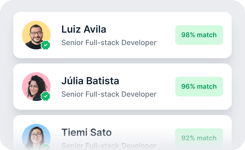Hire Remote Angular.js Developers
AngularJS is one of the most popular and widely used frameworks for web app development. The difference between AngularJS and Angular lies in their versions and architecture. AngularJS is the first version, a JavaScript library using two-way data binding, dependency injection, and a modular architecture. Angular, also called "Angular 2+" or simply "Angular," is a complete rewrite introduced in 2016, featuring improved performance, a component-based architecture, and better mobile support. As a result, the demand for skilled and dedicated AngularJS developers has surged in recent years. However, you can take time and effort to find the right talent to build robust and scalable applications using AngularJS.
AngularJS is constantly evolving, with new versions and updates being released periodically. This makes it essential for AngularJS developers to stay up-to-date with the latest trends and technologies to provide high-quality application development services and build custom solutions that meet your business challenges and needs. Therefore, you must ensure that potential candidates have the technical expertise and knowledge to stay ahead of the curve.
We’ll share some tips so you can understand the essential skills required to hire AngularJS developers, the top interview questions to ask candidates, and common questions that arise during the hiring process.
What to look for when hiring AngularJS developers
Technical skills
When hiring dedicated AngularJS developers, looking for candidates with strong technical skills in AngularJS, JavaScript, HTML, and CSS is vital. The candidate should have experience building single-page applications and be familiar with frameworks like Bootstrap, jQuery, and ReactJS.
The ideal candidate should have experience in implementing responsive web design and should be able to develop cross-browser-compatible applications. They should also have experience in integrating web and mobile apps with RESTful APIs and should be able to work with version control systems like Git.
Strong knowledge of AngularJS
When it comes to the technical skills of an AngularJS developer, having a thorough understanding of AngularJS is crucial. Directives, which allow developers to create custom HTML tags and attributes, are one of the core features of AngularJS. Your developer should be able to create custom directives and be familiar with built-in commands like ng-repeat and ng-model. In addition to directives, services are crucial in sharing data and functionality between different parts of an application. Your AngularJS developer should have experience creating and using services, including built-in services such as $http and $q. It's also essential for developers to have a firm grasp of dependency injection, which is used in AngularJS to manage dependencies between different parts of an application.
In addition to these key technical skills, developers should also have experience with routing, which handles navigation between different pages or views in an AngularJS application. They should be able to configure and use the built-in routing module effectively. Two-way data binding is another powerful feature of AngularJS that allows for automatic updates between the view and data changes. Your developer should be proficient in using two-way data binding in their applications. Finally, familiarity with AngularJS's set of lifecycle hooks is essential, as they allow developers to perform actions at different points in a component's lifecycle. By mastering these skills, developers can create robust, dynamic web applications that meet clients' needs.
Frontend development tools
HTML/CSS: AngularJS developers should have a strong understanding of HTML and CSS, which are the building blocks of web pages. HTML defines the structure and content of web pages, while CSS is used to style and format them. AngularJS developers must stay up-to-date with the latest HTML and CSS standards and best practices, including responsive design, cross-browser compatibility, and accessibility.
They should also be familiar with CSS frameworks like Bootstrap and Materialize, which can simplify creating responsive and visually appealing designs. With a solid understanding of HTML and CSS, AngularJS developers can seamlessly integrate their code with web page content and design, resulting in visually appealing and accessible applications for all users.
Frontend build tools: AngularJS developers should have proficiency in using frontend build tools to optimize their development workflows and improve the performance of their applications. These tools include popular technologies such as Webpack, Grunt, Gulp, Babel, and ESLint. Webpack is widely used for bundling and optimizing JavaScript, CSS, and other assets. To start with, Grunt and Gulp are task runners that automate repetitive tasks such as minifying and concatenating files, compiling Sass and Less, and optimizing images.
On the other hand, Babel is a JavaScript transpiler that enables developers to write modern JavaScript code while still being compatible with older browsers. Finally, ESLint is a linter that checks code for errors, coding style, and best practices. With experience and knowledge of these frontend build tools, AngularJS developers can streamline their workflows, create maintainable and efficient code, and ensure the best performance of their applications.
Browser developer tools: AngularJS developers must proficiently use browser developer tools for debugging, testing, and optimizing web applications. These tools are built into modern web browsers and allow developers to inspect and modify a webpage’s HTML, CSS, and JavaScript in real-time. This enables them to quickly identify and resolve issues such as broken links, missing assets, and console errors and to test and optimize the performance of their applications.
The most commonly used browser developer tools include Chrome Developer Tools, Firefox Developer Tools, and Safari Web Inspector. These tools offer many features, such as network monitoring, JavaScript debugging, performance profiling, and different device sizes and resolutions emulation. With expertise in browser developer tools, AngularJS developers can efficiently debug and optimize their code, leading to better application performance and a smoother user experience in mobile apps for their customers.
Backend development tools
Regarding full-stack development in AngularJS, developers can proficiently use various backend development tools. Node.js is a popular tool for creating server-side applications using JavaScript and integrating them seamlessly with AngularJS code. It also provides access to multiple libraries and frameworks, such as Express.js, which simplifies server-side application development and facilitates the creation of RESTful APIs.
In addition to Node.js, developers should be familiar with popular backend frameworks and libraries to build robust web applications. These frameworks, such as Ruby on Rails for the Ruby programming language, Django for Python, and Laravel for PHP, provide a standardized structure and set of tools for server-side application development. By using these frameworks and libraries, developers can focus on the specific features of their applications, which can enhance the overall performance and user experience.
Database management is another crucial skill for AngularJS developers. They should be proficient in databases like MongoDB, MySQL, PostgreSQL, and ORM frameworks such as Sequelize and SQLAlchemy. These tools are used to store, manage, and retrieve data for web applications, allowing developers to interact with databases in an object-oriented manner. Expertise in databases and ORM frameworks can help developers build robust and scalable web applications with efficient data storage and retrieval capabilities.
Backend build tools such as npm and yarn are essential for automating backend app development tasks related to testing and deployment. They also manage dependencies, enabling developers to create robust and scalable applications that meet clients’ business needs. By having a solid understanding of both front-end and back-end web development tools, AngularJS developers can create high-quality applications that meet the needs of their clients.
Knowledge of testing frameworks
Knowing testing frameworks is essential for AngularJS developers. Testing frameworks help developers ensure that their code works as expected and catches errors before they reach production. AngularJS developers should be familiar with popular testing frameworks such as Jasmine, Protractor, Karma, Jest, and Cypress.
Jasmine provides a simple syntax for writing tests, and developers can use it to write unit tests, integration tests, and end-to-end tests for their AngularJS applications. Protractor is an end-to-end testing framework designed explicitly for AngularJS applications and can be used to simulate user interactions with the application.
Karma is a test runner for JavaScript that automates tests and can run them in real browsers or headless environments. Jest is a popular testing framework that provides a simple and fast way to write unit tests for JavaScript applications, including AngularJS.
Lastly, Cypress delivers an intuitive and interactive way to write end-to-end tests, simulate user interactions, and view video recordings of test runs. Istanbul is a code coverage tool used to measure the code coverage of tests. It can be used with Jasmine and Karma to track the percentage of code covered by tests. By knowing testing frameworks, AngularJS developers can ensure their applications are robust, reliable, and bug-free.
Communication skills
Strong communication skills are crucial for any developer, and AngularJS developers are no exception. When hiring an AngularJS developer, look for candidates who effectively communicate their ideas and thoughts with team members and stakeholders.
The candidate should have experience working in an Agile environment and should be able to participate in daily standup meetings, dedicated teams sprints, team planning, and retrospective meetings. They should also be able to write clean and well-documented code that is easy to understand and maintain.
Performance optimization
Performance optimization is critical to AngularJS development as it ensures that web applications are fast, responsive, and scalable. To achieve this, AngularJS developers should be familiar with several key areas of performance optimization:
- Minification and concatenation should be used to reduce file size and improve page load times.
- Lazy loading can load only necessary resources, reducing page load times and improving the user experience.
- Caching should be used to store frequently accessed data, reducing the number of requests made to the server.
- Optimizing images by compressing them and reducing their file size can significantly improve page load times.
- Lastly, performance testing should be performed regularly to identify and address performance issues before they become problematic.
By understanding and implementing these key areas of performance optimization, AngularJS developers can build fast, responsive, and scalable web applications that provide an exceptional user experience.
App Security
App security is critical to web application development, and AngularJS developers should understand app security principles and best practices. To ensure app security, AngularJS developers should be aware of several key areas:
- Input validation prevents security vulnerabilities like SQL injection or cross-site scripting (XSS) attacks. Developers should validate user input on both the client and server sides.
- Authentication and authorization mechanisms should be implemented to ensure that only authorized users can access sensitive data and functions.
- Web developers should use HTTPS to encrypt data transmitted between clients and servers, protecting web apps against network eavesdropping and man-in-the-middle attacks.
- AngularJS developers should be aware of common web application attacks such as cross-site scripting (XSS) and cross-site request forgery (CSRF), which can be prevented through input validation and secure coding practices.
- Lastly, the Content Security Policy (CSP) is a security feature that can help AngularJS developers prevent XSS attacks by limiting the sources of executable scripts in a web application.
To hire AngularJS developers, they should also be able to implement secure authentication and authorization mechanisms. Companies can build secure and reliable applications that protect user data and prevent security breaches by understanding these critical areas of mobile app development and security and hiring AngularJS developers.
Top 5 AngularJS Interview Questions
What is the difference between ng-if and ng-show/ng-hide directives in AngularJS?
This question tests the candidate's understanding of AngularJS directives, specifically the differences between ng-if and ng-show/ng-hide. You should ask this question to assess the candidate's knowledge of AngularJS and to determine whether they can use directives efficiently to manipulate the DOM.
An excellent answer to this question would explain that ng-if removes the element from the DOM if the expression inside evaluates to false, while ng-show/ng-hide hides or shows the element based on its expression. The candidate should be able to give examples of when to use each directive and explain why one might be better than the other in a particular situation.
What are directives in AngularJS?
This question is designed to test the candidate's understanding of one of the essential features of AngularJS, directives. You should ask this question to determine if the candidate understands how directives can be used to create reusable components and modify the behavior of DOM elements.
An excellent answer to this question would explain that directives are custom HTML tags and attributes that can be used to manipulate the behavior of DOM elements. The candidate should be able to explain the different types of directives, including attribute, element, and class directives, and provide examples of how they can be used to create reusable components.
What is dependency injection in AngularJS?
This query gauges the candidate's knowledge of a fundamental concept in AngularJS, dependency injection. You should ask this question to assess the candidate's ability to write modular, testable code using AngularJS.
An excellent answer to this question would explain that dependency injection is a design pattern that allows developers to inject dependencies, such as services, into an object rather than requiring the object to create its dependencies. The candidate should be able to explain how dependency injection works in AngularJS, provide examples of how it can be used to develop modular and testable code and discuss its benefits.
What is a service in AngularJS?
This question is designed to test the candidate's understanding of one of the critical components of AngularJS services. You should ask this question to determine if the candidate can write modular, reusable code using AngularJS.
An excellent answer to this question is that a service is a type of object in AngularJS that provides functionality to other parts of an application. The candidate should be able to provide examples of how services can be used to provide functionality across multiple components or modules, explain the benefits of using services, and demonstrate how to create and use services in AngularJS.
What is the difference between $scope and $rootScope in AngularJS?
This question tests the candidate's understanding of AngularJS architecture and how to write efficient and maintainable code using the framework. You should ask this question if the candidate understands the differences between $scope and $rootScope and can provide examples of when to use each.
An excellent answer to this question is that $scope is an object that defines properties and methods for a specific view or controller in AngularJS. At the same time, $rootScope is a unique scope available globally to all parts of an application. The candidate should be able to provide examples of when to use each scope, explain the benefits and drawbacks of using global variables, and demonstrate how to use $scope and $rootScope to write efficient and maintainable code in AngularJS.









